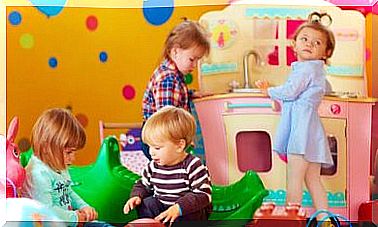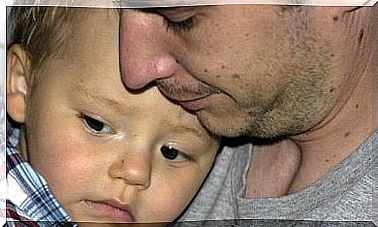What A Baby Hears Leaves Traces In The Brain

Babies are the most receptive creatures in the world. They need stimulation, affection, caresses and, above all, words. Everything a baby hears leaves a permanent trace in the brain. Therefore, we must guide them with a warm voice that embraces and stimulates.
Those who think it is ridiculous to talk to a newborn can not be more wrong. They also contribute to shortcomings and slow down the communicative processes a child needs to be able to develop.
Babies need to talk face to face. Talk to them often, sing to them, whisper and tell them stories. Although they still cannot interpret what the words mean, they are skilled translators of emotions. They are small pioneers in the language process.
They will slowly begin to understand the meaning of certain words as the days and months pass. Before we know it, they will understand sentences and start communicating themselves. This fantastic process must take place in a favorable, affectionate and familiar environment.
Even if we do not talk directly to our newborns , everything they hear is played into their brains. Therefore, you should never hesitate, you are doing well. If you are a parent who never stops talking to your baby, your child is really lucky to have you.
Routines, moments that benefit communication

We all know that newborns spend the majority of their time sleeping. During their first weeks and months of life, however, there are times when we can begin the magical process of stimulating the baby’s brain through language.
- Breastfeeding is without a doubt the best, most magical and important moment to talk to your baby.
- Make sure your tone is warm and positive, and always use positive intonation.
- Try to keep eye contact when changing your baby’s diaper, putting clothes on, and taking them off.
- Bathing is a relaxing moment where babies are receptive to their parents’ voices and gestures.
- If you manage to get a smile, you can be sure that you have left a mark in your brain of positivity and love.
Mother’s voice guides the child
The mother’s voice has power, it has always been there, long before the baby came into the world. A child has already spent 9 months in the womb with the woman who is now rocking him, feeding him and taking care of him.
- When babies are born, they already recognize the mother’s voice. Amniotic fluid is a good conductor of sound; as soon as the fetus develops its hearing, the mother’s voice follows them every day.
- Babies have no vocabulary, we all know that. But as I said, the point is not to make the child understand the semantics of each phrase.
Words must be followed by gestures

Communicating with your baby needs to be reinforced with gestures and an appropriate tone. This way you can consolidate both verbal and non-verbal language. At the same time, gestures are a great way to promote mood.
- Never forget to smile when talking to your baby, and always try to keep eye contact.
- You should also have short response times, ie. wait for the baby to respond. Wait until it makes a sound, widens its eyes, beeps a little or even smiles.
It is also very important to try to understand your baby’s communicative process. Babies also make gestures, smiles and a variety of sounds. In this way we make them feel that we understand them. Everything they say is important and valued.
The keys to “baby talk”: something we all do without realizing it
The way adults talk to babies has been coined as “baby talk”. It is a concept that most parents use every day.
- No adult talks to a baby in the same way they would talk to other adults. Our brains actually know how to interact with babies in the best way to stimulate communicative processes.
- We must not forget that language is the genetic imprint that sets us apart from other primates. Be prepared to get your children to practice their language skills from an early age.
- Talk to them in a light tone to get their attention.
- We also make sounds that stimulate new sensations: laughter, chatter, etc.
- Nobody has taught us that, but it is instinctive. We can sometimes say words that have no meaning, but those words can still bring peace to our babies.

In summary, there are countless reasons to start communicating with your child as early as possible. From the first moment they come into the world and have their skin close to yours. They need you, and they also need to learn how to communicate.
Remember that all the first words we share with them leave a mark on the brain. Every word your child hears will put it on the right track to mastering the language.









